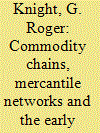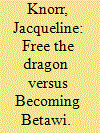| Srl | Item |
| 1 |
ID:
130577


|
|
|
|
|
| Publication |
2014.
|
| Summary/Abstract |
This paper discusses the foundational history of a major European mercantile house in colonial South East Asia in the context of commercial developments that had both a regional and global reach. In so doing, it seeks to relate a local and historically particular event to a broader world pattern defined by three rapidly evolving commodity chains, based respectively on the production, distribution and consumption of cotton goods, coffee and opium. In this context, the paper argues that the hard-won commercial success of the firm in question resulted from a significant degree of withdrawal from the bilateral ties between colony and metropolis inherent in the cotton and coffee commodity chains. In their place, the firm had recourse to several varieties of the inter-Asian trade, of which the opium commodity chain constituted the key dimension.
|
|
|
|
|
|
|
|
|
|
|
|
|
|
|
|
| 2 |
ID:
086294


|
|
|
|
|
| Publication |
2009.
|
| Summary/Abstract |
The Chinese in Indonesia suffered considerable discrimination particularly during Suharto's rule (1967-1998). They were considered a foreign threat that needed to be kept under state control. Since the end of Suharto's regime and as a result of liberalisasi, demokratisasi and desentralisasi a revival of Chinese identity has set in, initiating a public discourse on the compatability of Chinese and Indonesian identity. This discourse refers to different categories of identification which are connected with specific conceptualizations concerning the interrelatedness of indigeneity, ethnicity and nationalism in Indonesia and Jakarta in particular.
1This paper is based on the analysis of the relevant literature concerning its theme and of the data gathered during field research in Jakarta between 2000 and 2002 and during shorter stays thereafter. Most responses and statements by informants quoted in this paper have been translated from Indonesian to English. In some cases, conversations and interviews took place in different languages besides Indonesian, namely in English, German and/or Dutch, because informants wanted to practise their foreign language knowledge.
|
|
|
|
|
|
|
|
|
|
|
|
|
|
|
|